Coffee, Tea and Alternatives and Health plus Fitness
Coffee & Blood Tests: How Your Morning Brew Affects Results

As someone who has to undergo regular blood tests for medical reasons, I understand the importance of accurate results. Blood tests are a crucial tool for diagnosing and managing medical conditions, but their accuracy can be influenced by external factors like medication, eating habits, and lifestyle choices. One external factor that is often overlooked is coffee consumption, which can affect blood test results.
In this article, I will explore how coffee affects blood test results and provide guidelines for accurate results. It is essential to prepare adequately for blood tests to ensure that the results are accurate. Preparation includes fasting for a designated period, avoiding certain medications, and limiting caffeine intake.
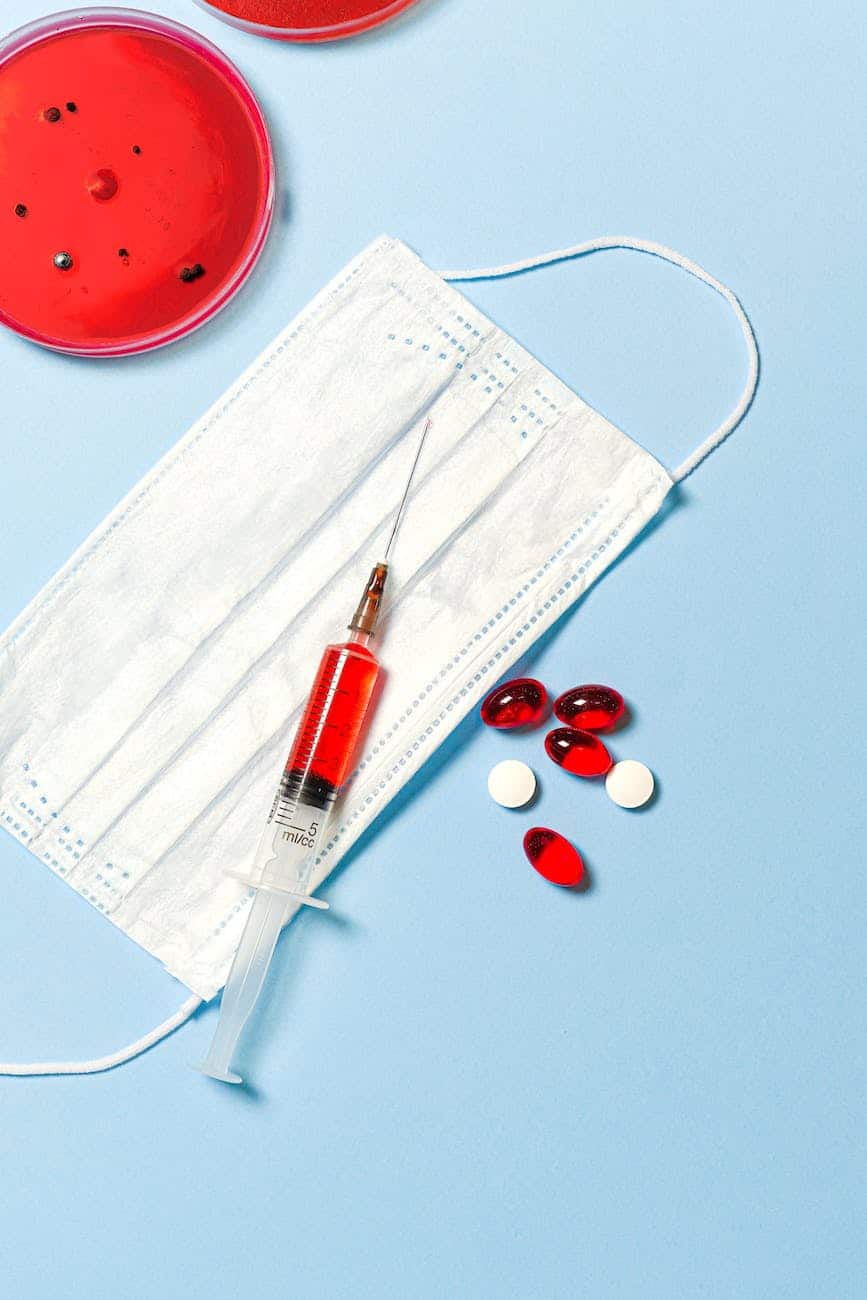
Coffee consumption, specifically, can affect blood test results, and it is crucial to understand how much of an impact it can have. By understanding the impact of coffee on blood tests, individuals can make informed decisions about their morning brew and ensure that their results are as accurate as possible.
Key Takeaways
- Blood tests are important for diagnosing and managing medical issues, but external factors such as coffee can affect the results.
- Guidelines for accurate results include limiting coffee to one cup 2 hours before the test, no sweeteners or creamers, and sticking to water only afterwards.
- Even decaf coffee can have an impact on certain blood test results due to the presence of other compounds.
- Studies show up to 25% of tests are inaccurate due to not following the recommended guidelines.
Blood Test Basics
I know that blood tests are important for diagnosing and managing medical issues. They analyze components like glucose, protein, cholesterol, white cells, and red cells. However, the results can be affected by external factors such as eating habits, medications, and existing medical conditions. That’s why preparation is important, and fasting for at least two hours before some tests is recommended.
Common blood tests include those that check blood sugar levels, cholesterol, and white blood cell count. To ensure accurate results, it’s essential to follow the guidelines, which often include fasting for a specific period before the test. This is important to ensure that external factors don’t interfere with the results.
Drinking coffee, for example, can affect blood sugar levels and other test results. Therefore, limiting coffee to one cup two hours before the test, without sweeteners or creamers, and sticking to water only afterward is recommended.
Preparing for Accurate Results
To ensure accurate test results, it’s important to follow preparation guidelines such as limiting intake of certain substances and fasting before the test.
When preparing for a blood test, it’s recommended to fast for at least two hours before the test. This means avoiding any food or beverages, including coffee. Coffee can affect blood sugar levels and other test results, so it’s important to limit intake to one cup at least two hours before the test and to avoid adding any sweeteners or creamers to the coffee.
After the test, it’s recommended to stick to water only to ensure accurate results. If you need a pick-me-up before the test, alternative options include drinking water, herbal tea, or having a light meal without sugar or fat.
Fasting guidelines are important to follow to ensure accurate blood test results. However, it’s important to note that fasting guidelines can vary depending on the type of test being performed. Some tests may require a longer fasting period, such as eight to twelve hours. It’s important to follow the specific fasting guidelines provided by your healthcare provider to ensure accurate results.
By following the recommended guidelines, you can help to prevent inaccurate results and ensure that your healthcare provider has accurate information to diagnose and manage any medical issues.
Impact of Coffee and Caffeine
Limiting caffeine intake is crucial for accurate medical diagnostics. This includes reducing coffee consumption before a blood test as it can affect certain test results. Here are three things to keep in mind when it comes to coffee and its impact on blood tests:
- Coffee can affect blood sugar levels, which is why it’s recommended to avoid drinking it for at least 8-12 hours before a blood test. This will ensure that the results accurately reflect your body’s true state.
- Even decaf coffee can have an impact on certain blood test results due to the presence of other compounds. Therefore, it’s best to stick to water or herbal tea before a blood test.
- Studies have shown that up to 25% of blood test results are inaccurate due to not following the recommended guidelines. By limiting coffee consumption and following the preparation guidelines, you can ensure accurate results and receive proper medical care.
It’s important to prioritize your health and be mindful of how coffee consumption can affect your medical diagnostics. By following the recommended guidelines for preparing for a blood test, you can ensure that your results accurately reflect your body’s true state and receive proper medical care.
Frequently Asked Questions
Can drinking coffee affect all types of blood tests?
In my experience, drinking coffee can affect certain blood test results, particularly those related to lipid profile and liver function tests. Consumption of caffeine can cause an increase in triglycerides and LDL cholesterol levels, leading to inaccurate readings.
Additionally, caffeine can affect liver enzymes, leading to false positives or negatives in liver function tests. Therefore, it’s recommended to avoid coffee intake for at least 8-12 hours before these specific blood tests to ensure accurate results.
It’s important to follow the guidelines provided by healthcare professionals to obtain the most accurate readings possible.
How long before a blood test should you stop consuming caffeine?
As someone who’s experienced the frustration of inaccurate blood test results, I understand the importance of optimal caffeine cessation before a blood test.
It’s recommended to stop consuming caffeine at least 8-12 hours before a blood test to ensure accurate results.
Caffeine can impact test accuracy by affecting blood sugar levels and other components analyzed in the test.
Studies have shown that up to 25% of blood tests can be inaccurate due to not following the recommended guidelines.
Therefore, it’s crucial to adhere to the guidelines and limit caffeine consumption before a blood test.
Are there any other beverages or foods that should be avoided before a blood test?
When preparing for a blood test, there are certain guidelines that must be followed to ensure accurate results.
In addition to fasting for a specific period of time, there are also alcohol restrictions to consider. It’s recommended to avoid consuming alcohol for at least 24 hours before a blood test, as it can affect liver function test results.
As for fasting guidelines, it’s important to avoid any food or drink (besides water) for at least 8-12 hours before the test, as certain foods and beverages can affect the results. For example, fruit juices and caffeinated beverages like energy drinks and tea should be avoided.
By following these guidelines, doctors can ensure accurate results and make appropriate diagnoses and treatment plans.
Can drinking decaf coffee still affect certain blood test results?
Drinking decaf coffee can still affect certain blood test results due to the presence of other compounds.
As someone who’s undergone numerous blood tests, I’ve learned that preparation is key to ensuring accurate results.
Decaf alternatives such as herbal tea and water are recommended before a blood test to avoid any potential interference from coffee.
It’s important to consider the impact of medication on test results as some medications can cause significant changes in blood composition.
It’s always best to consult with a healthcare professional regarding medication use before undergoing any blood tests.
How can one ensure accurate blood test results while working remotely?
Preparing for blood tests while working remotely can be quite challenging, but with some simple tips, it can be done accurately.
Firstly, it’s important to follow the guidelines provided by the healthcare provider to ensure accurate results.
Secondly, it’s crucial to schedule the blood test at a convenient time to avoid stress and multitasking.
Thirdly, one should avoid consuming coffee and other caffeinated beverages for at least 8-12 hours before the test to ensure accurate results.
Fourthly, one should stay hydrated by drinking plenty of water and avoiding alcohol and sugary drinks.
Lastly, it’s important to maintain a healthy lifestyle, including a balanced diet and regular exercise, to keep the blood results normal.
These tips can help one prepare for remote blood tests and ensure accurate results, even while working from home.
Conclusion
In conclusion, it’s vital to consider the impact of coffee consumption on blood test results. While coffee can provide a much-needed energy boost in the morning, it can also affect the accuracy of blood test results.
By following the guidelines for preparation and avoiding coffee before a blood test, patients can ensure that their results are as accurate as possible.
Regular blood tests are crucial for identifying medical issues quickly, and good lifestyle habits can help maintain optimal health. By staying informed and making conscious choices about our habits, we can take control of our health and wellbeing.
Remember to always consult your doctor for guidance and recommendations on how to prepare for a blood test and maintain a healthy lifestyle.
In the vast and diverse world of coffee, coffee alternatives, and tea, Olivia has found her calling. As an author and a dedicated coffee and tea aficionado, her work for Cappuccino Oracle reflects her profound love and understanding of the intricate complexities found within these beverages. Olivia’s passion for the subject serves as both a catalyst for her creativity and a connection point with her audience.
Olivia’s appreciation for coffee, coffee alternatives, and tea blossomed at an early age. She discovered that these beverages invigorated her senses and stimulated her creative spirit. From the nuanced flavors of single-origin roasts to the captivating narratives intertwined with coffee, coffee alternatives, and tea trade and culture, Olivia found an unlimited source of inspiration in her daily cup.
Her love for these beverages and her talent for storytelling eventually converged at Cappuccino Oracle. As an author, Olivia’s mission is to illuminate the intricate tapestry that makes up the world of coffee, coffee alternatives, and tea. Her articles span a diverse range of topics, encompassing everything from the unique flavors of different brews to the sociocultural history intertwined with their cultivation and consumption.
Coffee, Tea and Alternatives and Health plus Fitness
How Much Coffee Should One Consume Daily for Metabolic Acceleration?

Hey there! Did you know that coffee has the potential to boost your metabolism? Well, it’s true! In fact, studies have shown that consuming a moderate amount of coffee daily can help accelerate your metabolic rate.
But here’s the burning question: how much coffee should one actually drink to reap these benefits? In this article, we’ll explore the factors that determine the optimal daily coffee intake for metabolic acceleration.
So grab a cup of joe and let’s dive in!
Key Takeaways
- Moderate coffee consumption can boost metabolism.
- Optimal daily coffee intake varies based on individual caffeine sensitivity.
- Pay attention to your body’s reaction to caffeine and adjust consumption accordingly.
- Limit coffee intake to one or two cups per day if sensitive to caffeine.
Factors Affecting Daily Coffee Intake for Metabolic Acceleration
I’ve found that three cups of coffee per day really helps to boost my metabolism. However, determining the right coffee intake for metabolic acceleration can vary depending on individual caffeine sensitivity.
Some people may experience a heightened metabolic response with just one cup of coffee, while others may require more. It’s crucial to listen to your body and adjust your coffee consumption accordingly.
Pay attention to how your body reacts to caffeine and monitor any side effects such as restlessness, increased heart rate, or difficulty sleeping. If you find that you’re sensitive to caffeine, it may be best to limit your coffee intake to one or two cups per day.
Understanding Coffee Tolerance and Metabolic Benefits
To fully comprehend the metabolic benefits of coffee, it’s essential to understand one’s individual coffee tolerance. Coffee tolerance refers to how well our bodies can handle and process caffeine. Some people can drink multiple cups of coffee without feeling any negative effects, while others may experience jitters and anxiety after just a single cup.
Understanding your coffee tolerance is important because it can help you determine the optimal amount of coffee to consume for metabolic acceleration. Factors that influence coffee tolerance include genetics, age, overall health, and medication use.
The Role of Underlying Health Conditions in Determining Coffee Consumption
Having underlying health conditions can greatly impact the amount of coffee I should consume, so it’s important to consider these factors when determining my coffee intake. While coffee has been associated with various health benefits, such as improved cognitive function and reduced risk of certain diseases, it’s essential to understand how it may interact with my specific health risks.
For instance, individuals with conditions like hypertension or acid reflux may need to limit their coffee consumption due to its potential to increase blood pressure or worsen acid reflux symptoms. Consulting with a healthcare professional can provide valuable insights into the optimal amount of coffee I can safely consume while managing my underlying health risks.
Transitioning into the next section, let’s explore how coffee can affect weight management and find the optimal daily amount.
Coffee and Weight Management: Finding the Optimal Daily Amount
Drinking coffee in moderation can potentially aid in weight management by boosting metabolism and increasing fat oxidation. As an avid coffee lover, I’ve always been curious about how much coffee I should consume daily to maximize these benefits. After thorough research, I’ve found some evidence-based guidelines that can help us find the optimal daily amount of coffee for metabolic acceleration.
Here are some key points to consider:
- Coffee and exercise: Consuming coffee before a workout can enhance performance by increasing endurance and improving focus.
- Coffee and appetite suppression: Caffeine in coffee can temporarily suppress appetite, making it easier to control calorie intake.
- Individual tolerance: The optimal amount of coffee varies from person to person, so it’s important to listen to your body and avoid excessive consumption.
- Timing matters: Drinking coffee in the morning or before exercise can have the greatest impact on metabolism and fat oxidation.
Exploring the Complex Relationship Between Coffee and Metabolic Acceleration
As a coffee enthusiast, I find the intricate connection between coffee and metabolic acceleration fascinating. Many athletes rely on coffee as a pre-workout beverage to enhance their athletic performance. Coffee contains caffeine, which stimulates the central nervous system and increases alertness. This can lead to improved focus, endurance, and even strength during exercise.
Additionally, coffee has been found to have a positive impact on sleep quality. Studies have shown that moderate coffee consumption can improve sleep latency and reduce the risk of sleep disturbances. However, it’s important to note that excessive caffeine intake can have detrimental effects on both athletic performance and sleep quality.
It’s recommended to consume no more than 400mg of caffeine per day, which is roughly equivalent to 4 cups of brewed coffee. As with any dietary choices, it’s best to listen to your body and make adjustments accordingly.
Frequently Asked Questions
Can Drinking Coffee Help With Weight Loss?
Drinking coffee can indeed help with weight loss. Coffee contains caffeine, which has been shown to increase metabolism and enhance fat burning. Studies have found that caffeine can boost metabolic rate by 3-11%, leading to greater calorie burn throughout the day.
Additionally, coffee can also suppress appetite, making it easier to stick to a calorie-controlled diet. However, it’s important to note that excessive coffee consumption may have negative effects on health, so moderation is key.
Is It Safe to Consume More Than the Recommended Daily Amount of Coffee for Metabolic Acceleration?
It’s important to consider the safe consumption of coffee, especially when trying to accelerate metabolism. Consuming more than the recommended daily amount of coffee may have long-term effects on our health.
While coffee can temporarily increase metabolism, it’s crucial to find a balance that works for us individually. Consulting with a healthcare professional can provide personalized guidance and ensure we’re optimizing our health without compromising it.
Prioritizing our well-being is key when making choices about coffee consumption for metabolic acceleration.
Does the Type of Coffee (E.G., Regular, Decaf, Espresso) Affect Its Metabolic Benefits?
Regular coffee vs. decaf: Which type is more effective for metabolic acceleration?
Well, when it comes to boosting metabolism, regular coffee seems to have the upper hand. It contains caffeine, which has been shown to increase metabolic rate and fat oxidation.
Decaf coffee, on the other hand, doesn’t provide the same benefits since it has had most of the caffeine removed.
As for espresso, while it may give you a quick energy boost, there isn’t enough evidence to suggest it’s more beneficial for metabolism than regular coffee.
Are There Any Health Conditions That Could Be Worsened by Drinking Coffee for Metabolic Acceleration?
When it comes to coffee and metabolic acceleration, it’s important to consider any potential risks. Certain health conditions can be worsened by excessive coffee consumption. It’s crucial to be mindful of this and adjust our coffee intake accordingly.
While coffee can have its benefits, it’s always best to consult with a healthcare professional if you have any concerns. Taking care of our health should always be a top priority, even when it comes to something as simple as enjoying a cup of coffee.
Can Drinking Coffee at Different Times of the Day Have Different Effects on Metabolism?
Drinking coffee at different times of the day can indeed have different effects on metabolism. For example, consuming coffee before exercise has been shown to enhance fat burning and improve athletic performance.

However, it’s important to note that drinking coffee too close to bedtime can disrupt sleep quality due to the stimulating effects of caffeine.
It’s best to find a balance that works for you, considering both the benefits and potential drawbacks of caffeine consumption.
Conclusion
In conclusion, finding the optimal daily amount of coffee for metabolic acceleration depends on various factors such as individual tolerance, underlying health conditions, and weight management goals.
It’s important to strike a balance and listen to your body’s needs.
Like a delicate dance, let coffee be the rhythm that accelerates your metabolism, but remember to also prioritize overall health and well-being.
With moderation and mindfulness, coffee can be a flavorful ally in your journey towards a healthier metabolism.
In the vast and diverse world of coffee, coffee alternatives, and tea, Olivia has found her calling. As an author and a dedicated coffee and tea aficionado, her work for Cappuccino Oracle reflects her profound love and understanding of the intricate complexities found within these beverages. Olivia’s passion for the subject serves as both a catalyst for her creativity and a connection point with her audience.
Olivia’s appreciation for coffee, coffee alternatives, and tea blossomed at an early age. She discovered that these beverages invigorated her senses and stimulated her creative spirit. From the nuanced flavors of single-origin roasts to the captivating narratives intertwined with coffee, coffee alternatives, and tea trade and culture, Olivia found an unlimited source of inspiration in her daily cup.
Her love for these beverages and her talent for storytelling eventually converged at Cappuccino Oracle. As an author, Olivia’s mission is to illuminate the intricate tapestry that makes up the world of coffee, coffee alternatives, and tea. Her articles span a diverse range of topics, encompassing everything from the unique flavors of different brews to the sociocultural history intertwined with their cultivation and consumption.
Coffee, Tea and Alternatives and Health plus Fitness
Is Morning Coffee or After-Meal Coffee Better for Boosting Metabolism?

As someone who loves coffee, I’ve often pondered about the ideal time to indulge in my favorite brew to help boost metabolism. Should I opt for that piping hot cup right when I wake up or should I wait until after a meal?
In this article, we’ll explore the effects of morning coffee and after-meal coffee on your body’s metabolic rate. With evidence-based insights, we’ll uncover which option might be more beneficial for kickstarting your metabolism and supporting your weight loss goals.
So grab your mug and let’s dive into the science behind coffee’s impact on metabolism.
Key Takeaways
- Morning coffee can increase metabolic rate and enhance fat burning due to the caffeine content.
- Timing of coffee consumption in the morning may have a more significant effect on metabolism due to the body’s circadian rhythm.
- Excessive caffeine intake can lead to negative side effects like increased heart rate and sleep disturbances, so moderation is key.
- Having coffee after meals can increase the body’s metabolic rate and help burn more calories throughout the day.
The Effects of Morning Coffee on Metabolism
I love how morning coffee speeds up my metabolism. It’s a great way to kick-start my day and get my body ready for the tasks ahead. But like everything, there are pros and cons to consider.
On the positive side, research suggests that caffeine found in coffee can increase metabolic rate and enhance fat burning. This can be beneficial for weight management. Additionally, the timing of coffee consumption may play a role in its impact on metabolism. Drinking coffee in the morning may have a more significant effect due to the body’s natural circadian rhythm.
However, it’s important to note that excessive caffeine intake can lead to negative side effects, such as increased heart rate and sleep disturbances. Moderation is key when it comes to reaping the benefits of morning coffee for boosting metabolism.
Pros and Cons of Having Coffee on an Empty Stomach
Having coffee on an empty stomach can provide a quick energy boost and help with mental alertness.
However, it can also lead to stomach irritation, acid reflux, and increased anxiety.
It’s important to consider these pros and cons before deciding whether to have coffee on an empty stomach.
Empty Stomach Effects
Drinking coffee on an empty stomach can lead to increased acidity in the digestive system. While some people argue that having coffee on an empty stomach has certain benefits, it’s important to consider the potential negative effects as well.
When we consume coffee without any food, it can stimulate the production of stomach acid, which can lead to discomfort and heartburn. Additionally, coffee can also increase hunger levels, which might lead to overeating later in the day.
It’s recommended to have coffee after a meal or with a small snack to avoid these issues. This allows the stomach to have some food to buffer the acidity and can help regulate hunger levels.
Impact on Digestion Process?
My morning routine includes a cup of coffee, but I’m aware of the potential impact on my digestion process. While coffee can provide a much-needed metabolism boost, it can also have an effect on digestion. Here are three key points to consider:
-
Delayed Emptying: Coffee contains caffeine, which can slow down the emptying of the stomach. This means that the food you eat may take longer to move through your digestive system, potentially causing discomfort or indigestion.
-
Acid Production: Coffee stimulates the production of stomach acid, which is necessary for digestion. However, excessive acid can lead to heartburn or irritation of the stomach lining, especially for those with pre-existing conditions like acid reflux.
-
Nutrient Absorption: Some studies suggest that coffee may interfere with the absorption of certain nutrients, such as iron and calcium. This could potentially impact your overall nutritional status.

Understanding the effects of coffee on digestion is important for optimizing your health.
Now, let’s explore how coffee after meals affects your body’s metabolic rate.
How Coffee After Meals Affects Your Body’s Metabolic Rate
After meals, having a cup of coffee can actually help increase your body’s metabolic rate. Studies have shown that caffeine can stimulate thermogenesis, the process by which your body produces heat and burns calories.
This means that drinking coffee after meals may help you burn more calories throughout the day and potentially aid in weight management.
Timing and Metabolism Correlation
I’ve noticed that timing plays a crucial role in how my metabolism responds to coffee. When it comes to weight loss, understanding the relationship between timing and metabolism can be key. Here are three important points to consider:
-
Morning coffee: Consuming coffee in the morning can have a positive impact on metabolism. Studies have shown that caffeine can increase calorie burn and fat oxidation, helping to boost the body’s metabolic rate. Starting your day with a cup of coffee can give your metabolism a kick-start and help you burn more calories throughout the day.
-
Before exercise: Timing your coffee consumption before exercise can also be beneficial. Caffeine has been shown to improve athletic performance and increase calorie burn during exercise. Having a cup of coffee before your workout can enhance your fat-burning potential and optimize your calorie expenditure.
-
After meals: While coffee can have a short-term effect on metabolism, it’s important to note that the timing of coffee consumption after meals may not have a significant impact on calorie burn. However, it’s worth mentioning that black coffee is low in calories and can be a better choice compared to sugary beverages or snacks, which can contribute to weight gain.

Effects of Post-Meal Coffee
Having a cup of coffee after meals can potentially affect your body’s metabolic rate in various ways.
Many people enjoy a cup of coffee after a meal as a way to relax and digest. But does post-meal coffee have any benefits for our metabolism?
Research suggests that caffeine can increase our metabolic rate, leading to potential weight loss. However, the effect may be temporary and vary among individuals.
Furthermore, coffee stimulates the production of gastric acid, which aids in the digestion of food. This can be particularly helpful after a heavy or high-fat meal.

Additionally, coffee contains antioxidants that can support overall health.
It’s important to note that excessive consumption of coffee, especially with added sugar and cream, can have negative effects on our health. Moderation is key when it comes to enjoying the benefits of post-meal coffee.
Morning Vs. After-Meal Benefits
While I prefer to have my coffee in the morning, I wonder if there are any specific benefits to having it after a meal. After doing some research, I found that there are indeed some advantages to enjoying a cup of coffee after a meal. Here are three key benefits:
-
Improved digestion: Coffee can stimulate the production of stomach acid, which aids in the breakdown of food. This can lead to better digestion and nutrient absorption.

-
Increased metabolism: Coffee contains caffeine, which has been shown to temporarily boost metabolism. Consuming it after a meal can help increase calorie burn during digestion.
-
Enhanced exercise performance: Having coffee after a meal can provide a caffeine boost, which has been linked to improved athletic performance and increased endurance during exercise.
Understanding the Relationship Between Coffee and Weight Loss
Drinking coffee regularly can aid in weight loss by increasing metabolism and promoting fat burning. Coffee contains caffeine, a natural stimulant that can boost metabolic rate by up to 11%. This increase in metabolism can help the body burn more calories throughout the day, leading to weight loss over time.
Additionally, coffee has been shown to improve digestion, which can also contribute to weight loss. The caffeine in coffee can stimulate the muscles in the digestive system, promoting regular bowel movements and preventing constipation. This can help prevent bloating and improve overall digestion.
However, it’s important to note that while coffee can have these benefits, it should be consumed in moderation as excessive consumption can lead to negative health effects such as increased heart rate and insomnia. So, enjoy your cup of coffee, but remember to listen to your body and consume it in a balanced way.
Does Morning Coffee Really Kickstart Your Metabolism
I love how morning coffee can kickstart my metabolism and give me the energy I need to start the day. But does it really have an impact on weight loss? Let’s explore the science behind coffee’s impact on metabolism.
-
Caffeine Boost: Coffee contains caffeine, a natural stimulant that can increase metabolism and enhance fat-burning. Studies have shown that caffeine can temporarily boost metabolic rate by 3-11%.
-
Thermogenic Effect: Coffee has a thermogenic effect, meaning it increases the body’s production of heat and energy expenditure. This can lead to a higher calorie burn throughout the day.
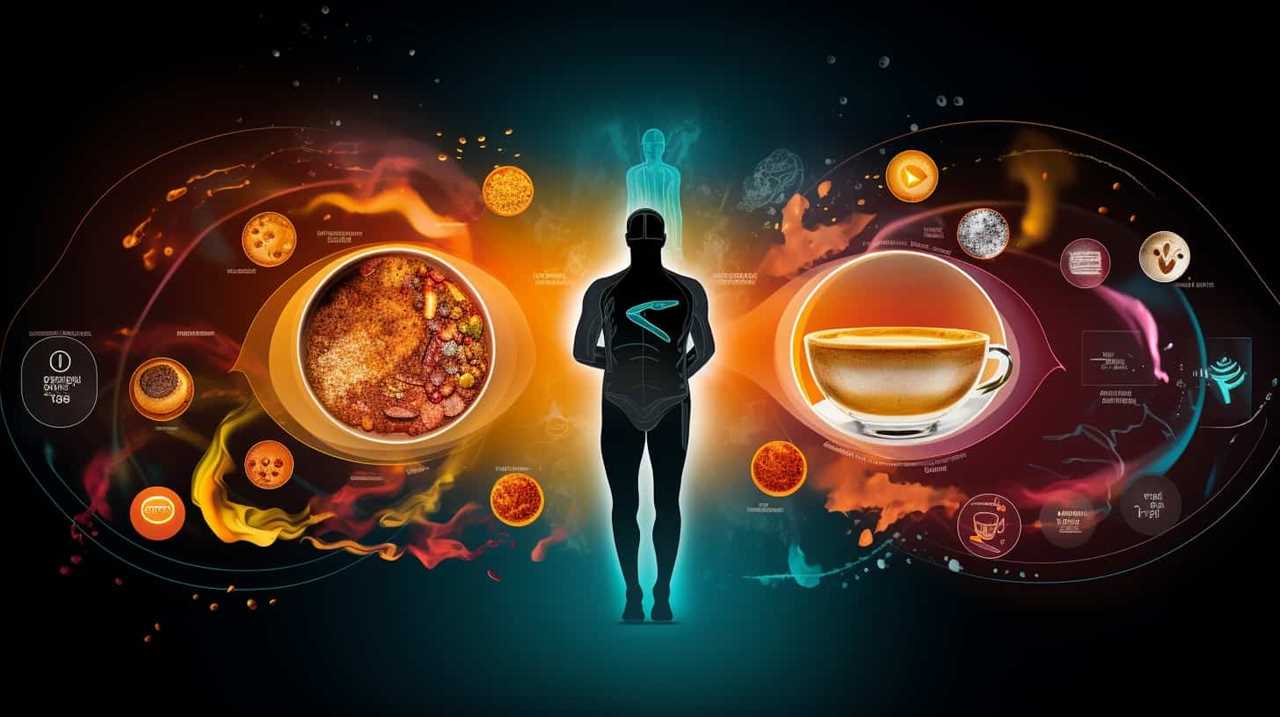
-
Appetite Suppression: Drinking coffee in the morning can help suppress appetite, leading to reduced calorie intake. This can be beneficial for weight loss efforts.
While coffee can have some positive effects on metabolism and weight loss, it’s important to remember that it’s not a magic solution. A balanced diet and regular exercise are still key.
Exploring the Science Behind Coffee’s Impact on Metabolism
One study found that consuming two cups of coffee per day can increase metabolic rate by up to 16%. This means that coffee has the potential to boost our metabolism and help us burn more calories throughout the day.
But does it matter when we drink our coffee? Recent research suggests that the timing of our coffee consumption may impact its effects on our metabolism.
For example, drinking coffee after a meal has been shown to improve insulin sensitivity, which can help regulate blood sugar levels and prevent weight gain.
On the other hand, having coffee in the morning may enhance fat oxidation, the process by which our body breaks down fat for energy.
Coffee and Its Role in Boosting Metabolic Function
Research has shown that coffee consumption can significantly increase metabolic function. This means that drinking coffee can help boost our body’s ability to burn calories and maintain a healthy weight. But what’s the best time to have that cup of joe for maximum metabolic benefits? Here are three key points to consider:
-
Timing matters: Consuming coffee in the morning can kickstart your metabolism and provide an energy boost for the day ahead. However, having a cup of coffee after a meal can also be beneficial. It can help stimulate digestion and increase the thermic effect of food, leading to more efficient calorie burning.

-
Caffeine content: The caffeine in coffee is the main driver behind its metabolic-boosting effects. Higher caffeine content in your coffee can have a more significant impact on your metabolic rate. So, choosing a coffee with a higher caffeine concentration can maximize its benefits.
-
Personal preference: Ultimately, the best time to drink coffee for metabolic benefits depends on your individual preferences and lifestyle. Whether you prefer a morning pick-me-up or an after-meal coffee, incorporating coffee into your routine can support a healthy metabolism.
Answering Common Questions About Coffee’s Effect on Metabolism
An interesting aspect of the current discussion topic is how coffee’s effect on metabolism can vary depending on individual factors and habits. When it comes to caffeine consumption, there are both pros and cons to consider.
On one hand, caffeine can increase metabolism and help burn calories. It also provides a temporary boost in energy and focus. However, it’s important to note that excessive caffeine intake can lead to negative effects such as increased heart rate, anxiety, and disrupted sleep patterns.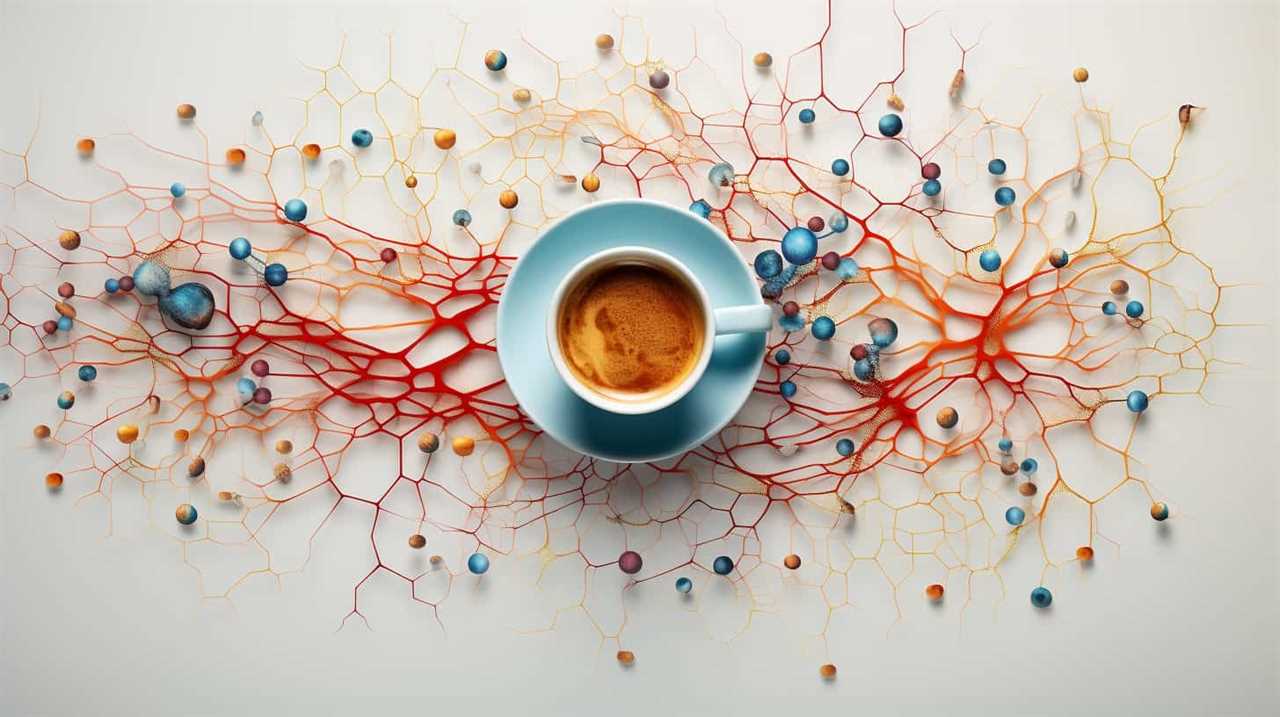
Additionally, the long-term effects of coffee on metabolism are still being studied. Some research suggests that regular coffee consumption may have a small positive impact on metabolism, while others indicate that the effects may diminish over time.
Ultimately, it’s essential to listen to your body and make informed decisions about coffee consumption based on your individual needs and preferences.
Frequently Asked Questions
Does Drinking Coffee Before Bed Have Any Impact on Metabolism?
Drinking coffee before bed can have an impact on metabolism. Caffeine, found in coffee, can affect sleep quality by disrupting the body’s natural sleep-wake cycle. It stimulates the nervous system, making it harder to fall asleep and potentially reducing the quality of sleep.
This can have indirect effects on metabolism, as lack of sleep is associated with weight gain and slower metabolism. It’s advisable to limit caffeine intake, especially in the evening, to ensure a good night’s sleep and support a healthy metabolism.
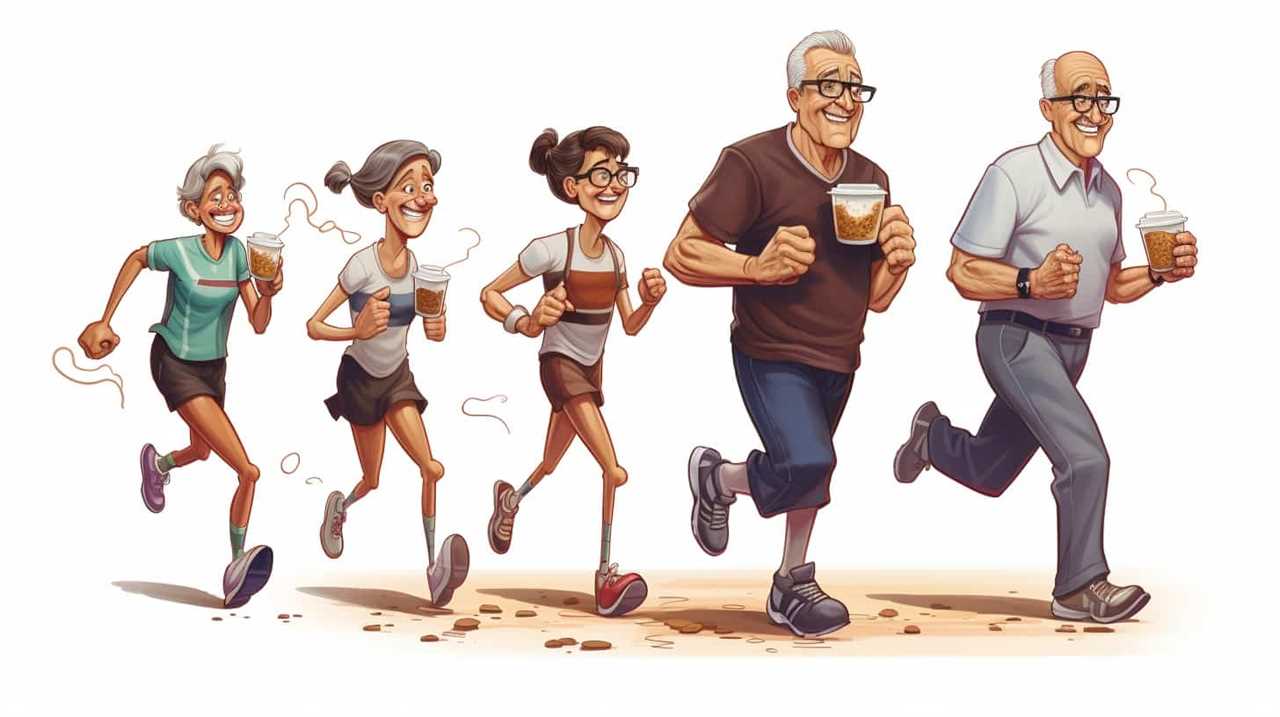
Can Decaffeinated Coffee Provide the Same Metabolic Benefits as Regular Coffee?
Decaffeinated coffee may not provide the same metabolic benefits as regular coffee due to its lower caffeine content. Caffeine has been shown to increase metabolic rate and promote fat oxidation. However, other compounds in coffee, such as antioxidants, may still offer some health benefits even without caffeine.
If you’re looking to boost your metabolism, it’s best to opt for regular coffee with its higher caffeine content. As always, moderation is key when it comes to caffeine intake.
How Long Does the Metabolic Boost From Coffee Last?
When it comes to the duration of coffee’s metabolic boost and the timing of coffee consumption for maximum benefits, it’s important to consider the current question.
How long does the metabolic boost from coffee last? Well, research suggests that the effects of caffeine can last for several hours, with peak levels reached around 30 to 60 minutes after consumption.
As for the timing, it’s generally recommended to have coffee in the morning to kickstart your metabolism and provide an energy boost for the day. However, individual preferences and routines may vary.
Does the Type of Coffee Brewing Method Affect Its Impact on Metabolism?
The impact of coffee temperature on metabolism and the effect of coffee acidity on metabolic rate are important factors to consider when discussing the benefits of coffee for boosting metabolism. Understanding how these factors interact can help us make informed choices about our coffee consumption.
Are There Any Negative Side Effects of Regularly Consuming Coffee for Metabolism?
Regularly consuming coffee can have negative health effects, especially in the long term. While it may boost metabolism, it’s important to be aware of potential side effects.
Excessive caffeine intake can lead to increased heart rate, digestive issues, and disrupted sleep patterns. It’s crucial to find a balance and not rely solely on coffee for metabolic benefits.
Prioritizing a healthy diet and exercise routine is key for long-term metabolic health.
Conclusion
In conclusion, whether you prefer morning coffee or after-meal coffee, both can have a positive impact on boosting your metabolism.
However, it’s important to listen to your body and find what works best for you.
Remember, coffee is just one piece of the puzzle when it comes to weight loss and metabolic function.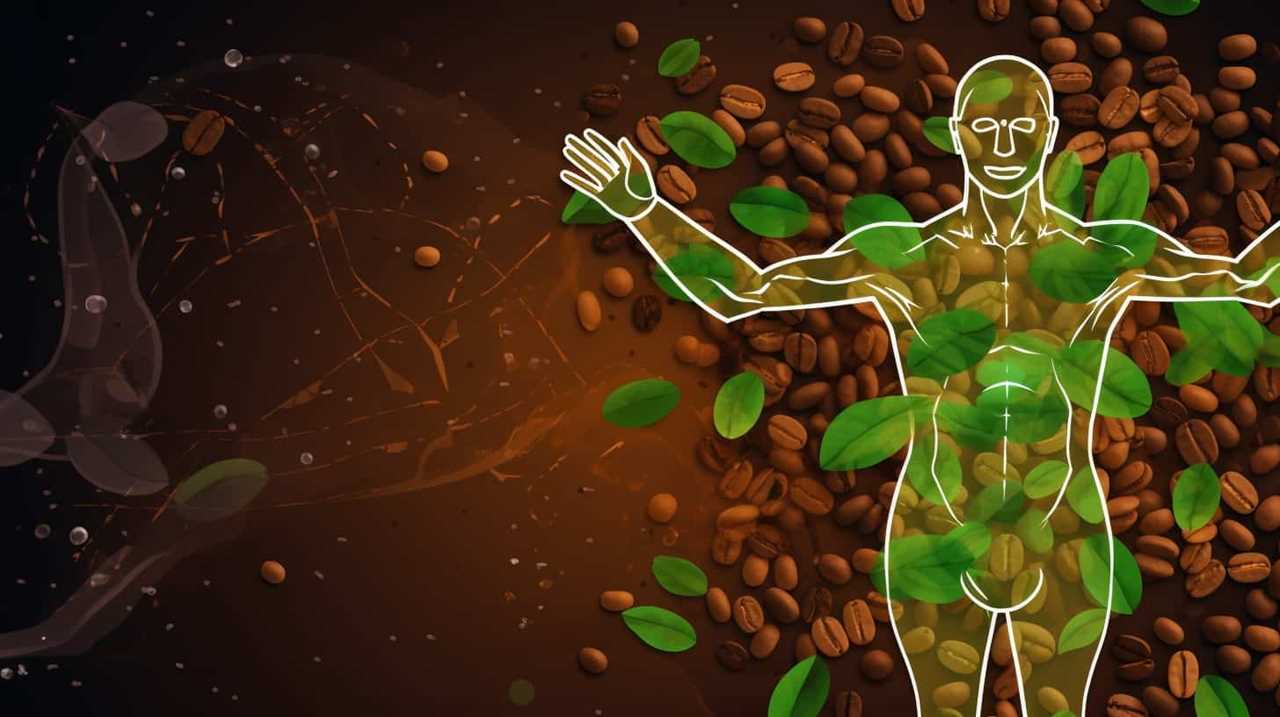
So, enjoy your cup of joe, but also prioritize a balanced diet and regular exercise for optimal results.
Cheers to a healthier, more energized you!
In the vast and diverse world of coffee, coffee alternatives, and tea, Olivia has found her calling. As an author and a dedicated coffee and tea aficionado, her work for Cappuccino Oracle reflects her profound love and understanding of the intricate complexities found within these beverages. Olivia’s passion for the subject serves as both a catalyst for her creativity and a connection point with her audience.
Olivia’s appreciation for coffee, coffee alternatives, and tea blossomed at an early age. She discovered that these beverages invigorated her senses and stimulated her creative spirit. From the nuanced flavors of single-origin roasts to the captivating narratives intertwined with coffee, coffee alternatives, and tea trade and culture, Olivia found an unlimited source of inspiration in her daily cup.
Her love for these beverages and her talent for storytelling eventually converged at Cappuccino Oracle. As an author, Olivia’s mission is to illuminate the intricate tapestry that makes up the world of coffee, coffee alternatives, and tea. Her articles span a diverse range of topics, encompassing everything from the unique flavors of different brews to the sociocultural history intertwined with their cultivation and consumption.
Coffee, Tea and Alternatives and Health plus Fitness
Is There a Connection Between The Temperature of Your Coffee and Your Metabolic Rate?

Have you ever considered the idea that the temperature of your coffee might have an effect on your metabolism? Recent studies suggest there could be a link between the two.
In this article, we will explore the scientific evidence behind this fascinating phenomenon. Through a comprehensive survey and analysis of various coffee temperatures, we aim to provide you with a better understanding of the potential health implications.
So grab a cup of coffee and join me as we delve into the world of coffee temperature and its impact on our bodies.
Key Takeaways
- Cold brew coffee may increase metabolic rate.
- Caffeine in cold brew coffee can boost metabolism.
- Hot coffee can speed up digestion.
- Drinking coffee at extremely high temperatures may increase the risk of esophageal cancer.
The Influence of Cold Brew on Metabolic Rate
I’ve noticed that drinking cold brew coffee seems to increase my metabolic rate. This observation led me to explore the potential influence of cold brew on weight loss.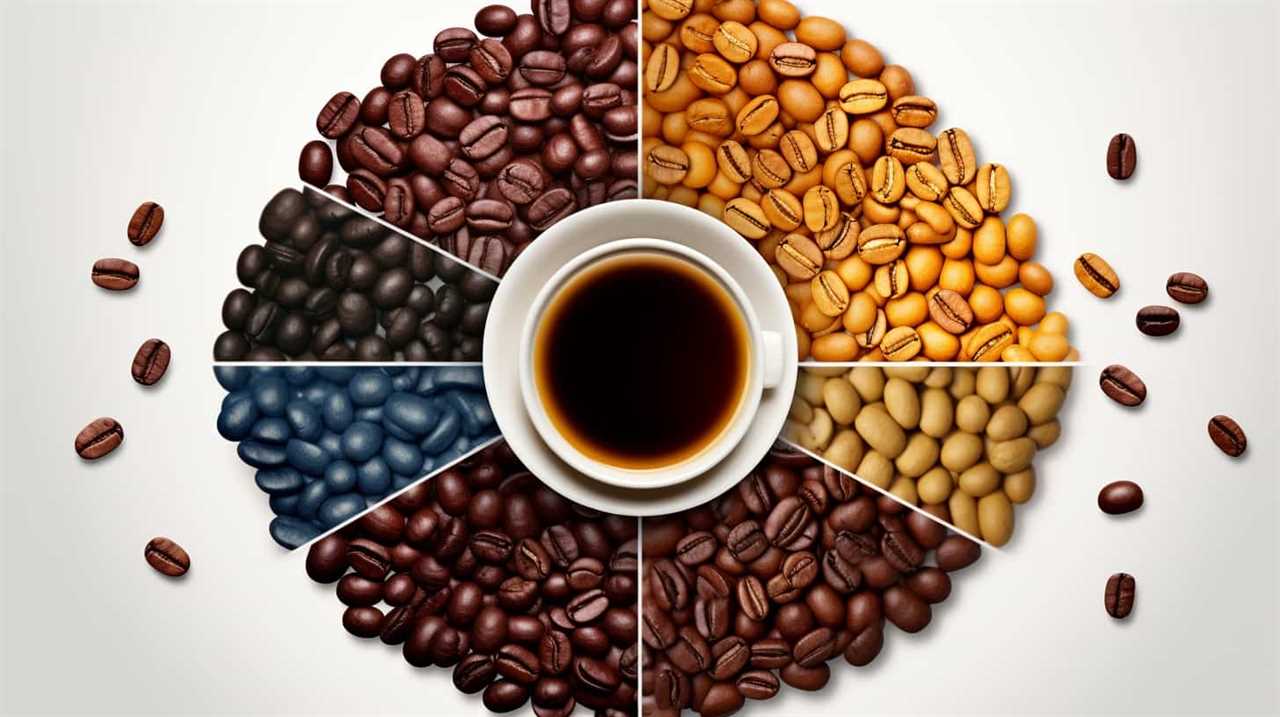
Several studies have shown that caffeine can have a positive effect on weight loss by boosting metabolism. Cold brew coffee, which is brewed with cold water over an extended period, contains higher levels of caffeine compared to regular hot brew. This higher caffeine content could potentially enhance the metabolic rate even further.
Additionally, the slow brewing process of cold brew coffee may lead to a higher extraction of caffeine, resulting in increased caffeine absorption in the body.
While more research is needed to fully understand the effects of cold brew on weight loss and caffeine absorption, these initial findings suggest that cold brew coffee may have a positive influence on metabolic rate and potentially aid in weight loss.
Effects of Hot Coffee on Digestion Speed
While hot coffee is often associated with a comforting morning routine, it’s important to consider the potential effects of temperature on digestion speed. The temperature of the food and beverages we consume can have an impact on how quickly our digestive system processes them.
When it comes to hot coffee, research suggests that it may actually speed up digestion. This is because hot temperatures stimulate the production of gastric juices, which help break down food more efficiently. Additionally, the heat from the coffee can cause the muscles in the digestive tract to contract and relax, facilitating the movement of food through the system.
However, it’s worth noting that the effects of hot coffee on digestion speed may vary from person to person. Furthermore, caffeine absorption is another factor to consider. Caffeine is known to stimulate the central nervous system and can increase metabolic rate. Therefore, consuming hot coffee with caffeine may have additional effects on digestion speed and metabolism.
Comprehensive Survey: Health Implications of Varying Coffee Temperatures
I’m currently researching the health implications of varying coffee temperatures through a comprehensive survey. Here are three key findings from my study:
-
Impact on sleep quality: Preliminary results suggest that consuming hot coffee before bedtime may negatively affect sleep quality. The elevated temperature of the beverage can interfere with the body’s natural cooling process, leading to restlessness and difficulty falling asleep.

-
Potential health benefits: On the other hand, evidence suggests that consuming coffee at a moderate temperature (around 135-150°F) may have certain health benefits. These include improved cognitive function, increased alertness, and a potential boost in metabolism.
-
Risk of burns: It’s crucial to be cautious when drinking hot coffee to avoid burns. High temperature liquids can cause damage to the mouth, throat, and digestive system. Opting for a slightly lower temperature can help minimize this risk and still provide a satisfying coffee-drinking experience.
As more data is analyzed and additional research is conducted, a better understanding of the health implications of varying coffee temperatures will emerge.
Exploring the Broader Health Implications of Coffee Temperature
Although more research is needed, evidence suggests that drinking coffee at extremely high temperatures may increase the risk of developing esophageal cancer.

However, the impact of coffee temperature on cognitive function and blood pressure is still a subject of debate. Some studies have shown that consuming hot coffee can improve cognitive performance and alertness due to the stimulating effects of caffeine.
On the other hand, high temperatures can also elevate blood pressure temporarily. It’s important to note that individual responses to coffee temperature may vary, and factors such as personal preferences, tolerance, and overall health should be considered.
To maintain a balanced approach, it’s advisable to consume coffee at a moderate temperature and be mindful of potential risks associated with excessively hot beverages.
Further research is necessary to fully understand the relationship between coffee temperature and its effects on cognitive function and blood pressure.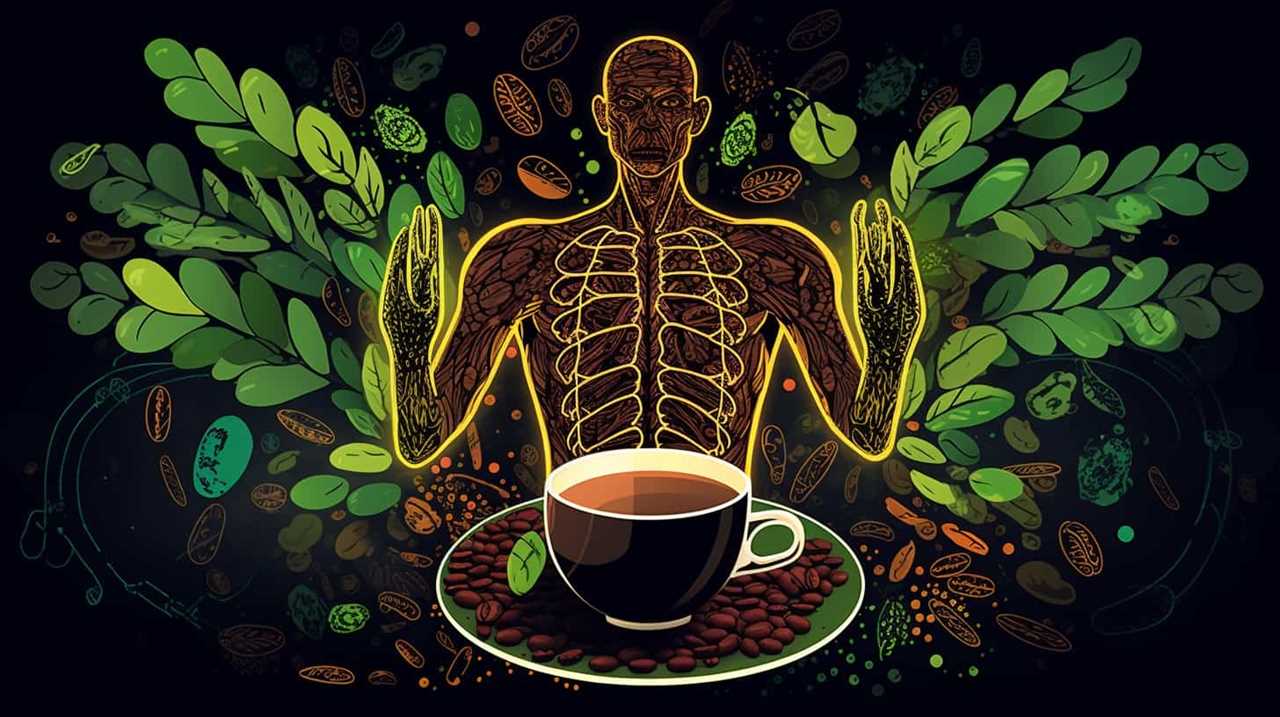
Addressing Inquiries: The General Impact of Coffee Temperature
Someone might wonder if the temperature of their coffee has any impact on their overall well-being, but it’s important to consider the general effects of coffee temperature on the body. Research on coffee temperature has revealed several interesting findings:
-
Burns and tissue damage: Hot coffee can cause burns and tissue damage if consumed too quickly or spilled. It’s crucial to let your coffee cool down before taking a sip to avoid any potential harm.
-
Taste and enjoyment: The temperature of coffee affects its taste and overall enjoyment. Too hot, and it can scorch your taste buds, making it difficult to fully appreciate the flavor. Conversely, coffee that’s too cold may lack the desired richness and warmth.
-
Digestion and metabolism: While there’s limited research on the direct impact of coffee temperature on metabolism, some studies suggest that consuming hot coffee may slightly increase metabolic rate. However, the effect is minimal and not significant enough to rely on coffee as a weight loss strategy.

Frequently Asked Questions
What Are the Potential Health Risks Associated With Drinking Hot Coffee?
Drinking hot coffee can pose potential health risks. The high acidity levels in coffee can lead to tooth enamel erosion over time.
Additionally, there’s a risk of burns or scalds when consuming hot beverages. It’s important to be cautious and allow the coffee to cool down before drinking to avoid these risks.
Taking preventative measures, such as using a thermal cup or adding ice, can also help protect against these potential health issues.
Can Drinking Cold Brew Coffee Help With Weight Loss?
Drinking cold brew coffee has gained popularity due to its refreshing taste and potential weight loss benefits. Cold brew is made by steeping coffee grounds in cold water for an extended period, resulting in a smoother and less acidic beverage.
Some studies suggest that the caffeine and antioxidants in cold brew may increase metabolism and aid in weight loss. However, more research is needed to fully understand the effects of cold brew on weight management.
Does the Temperature of Coffee Affect Its Caffeine Content?
When considering the temperature of coffee, it’s important to understand the effects on caffeine absorption and taste preference. Research suggests that higher temperatures can lead to faster caffeine absorption, resulting in a more immediate energy boost. However, taste preference may vary depending on personal preferences.
It’s crucial to note that individual reactions to caffeine and temperature can differ, and it’s best to consult with a healthcare professional for personalized advice.
Is It Safe to Consume Coffee That Has Been Left at Room Temperature for an Extended Period of Time?
When it comes to coffee safety, one question that often arises is whether it’s safe to consume coffee that has been left at room temperature for an extended period of time.
It’s important to consider the potential risks associated with consuming room temperature coffee, as it may become a breeding ground for bacteria if left out for too long.
Therefore, it’s generally recommended to consume coffee while it’s still hot or to properly store it in a refrigerator to maintain its freshness and reduce the risk of bacterial growth.
Can the Temperature of Coffee Impact Its Antioxidant Levels?
The temperature of coffee can indeed impact its antioxidant levels. Hotter temperatures tend to increase the release of antioxidants, which can have a positive impact on digestion and blood sugar levels.
However, it’s important to note that excessively hot temperatures can also lead to the destruction of certain antioxidants. Therefore, it’s recommended to consume coffee at a moderate temperature to optimize its antioxidant benefits.
Conclusion
In conclusion, the temperature of coffee may have some influence on our metabolic rate and digestion speed. Cold brew coffee has been found to potentially increase metabolic rate, while hot coffee may speed up digestion. However, more research is needed to fully understand the health implications of varying coffee temperatures.
It’s important to address these inquiries in order to better understand the general impact of coffee temperature on our overall well-being. Like a gentle breeze on a warm day, the temperature of our coffee may subtly affect our body’s functioning, encouraging us to explore further.
In the vast and diverse world of coffee, coffee alternatives, and tea, Olivia has found her calling. As an author and a dedicated coffee and tea aficionado, her work for Cappuccino Oracle reflects her profound love and understanding of the intricate complexities found within these beverages. Olivia’s passion for the subject serves as both a catalyst for her creativity and a connection point with her audience.
Olivia’s appreciation for coffee, coffee alternatives, and tea blossomed at an early age. She discovered that these beverages invigorated her senses and stimulated her creative spirit. From the nuanced flavors of single-origin roasts to the captivating narratives intertwined with coffee, coffee alternatives, and tea trade and culture, Olivia found an unlimited source of inspiration in her daily cup.
Her love for these beverages and her talent for storytelling eventually converged at Cappuccino Oracle. As an author, Olivia’s mission is to illuminate the intricate tapestry that makes up the world of coffee, coffee alternatives, and tea. Her articles span a diverse range of topics, encompassing everything from the unique flavors of different brews to the sociocultural history intertwined with their cultivation and consumption.
-

 Americano4 weeks ago
Americano4 weeks agoHow to Make Americano With Moka Pot
-

 Americano2 weeks ago
Americano2 weeks agoHow to Make Korean Iced Americano
-

 Americano4 weeks ago
Americano4 weeks agoHow to Make Iced Americano With Instant Coffee
-

 Americano4 weeks ago
Americano4 weeks agoHow to Make Americano With Bialetti
-

 Americano4 weeks ago
Americano4 weeks agoHow to Make Dutch Bros Americano
-

 Americano6 days ago
Americano6 days agoHow to Make an Iced Americano With Nespresso
-

 Americano2 weeks ago
Americano2 weeks agoHow Many Shots of Espresso for 16 Oz Americano
-

 Turmeric Tea1 week ago
Turmeric Tea1 week agoTurmeric Saffron Tea
















